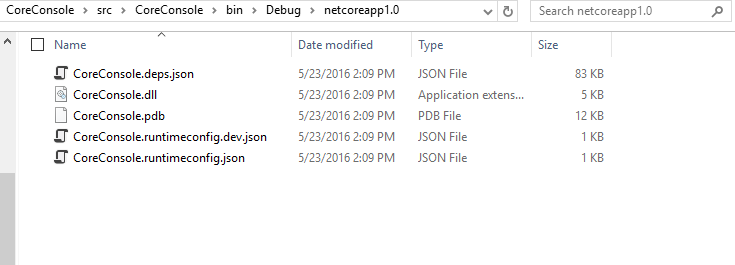There are actually 2 app models in .NET Core:
Portable apps: heavily inspired by "DNX console apps", these apps don't produce .exe files and are instead executed by the .NET Core shared runtime (whose version is defined by the Microsoft.NETCore.App package, thanks to its special type: platform attribute). The corresponding .NET Core runtime must be installed on the machine to be able to use portable apps. If the exact version cannot be found, an exception is thrown when running dotnet run.
Standalone apps: standalone apps are really similar to good old .NET console apps as they produce .exe files. The .NET Core runtime doesn't have to be installed on the machine, because it is directly embedded with the application itself.
You're currently using the first model. To use the standalone model, you need to tweak your project.json:
- Add a
runtimes section to list the environments your app will target (e.g win7-x64 or ubuntu.14.04-x64). You can find the complete list here.
- Remove the
Microsoft.NETCore.App dependency. You can replace it by this package instead: "NETStandard.Library": "1.5.0-rc2-24027".
Here's an example of a standalone app:
{
"buildOptions": {
"emitEntryPoint": true,
"preserveCompilationContext": true,
"warningsAsErrors": true
},
"dependencies": {
"Microsoft.Extensions.Configuration.Binder": "1.0.0-rc2-final",
"Microsoft.Extensions.Configuration.CommandLine": "1.0.0-rc2-final",
"Microsoft.Extensions.Configuration.EnvironmentVariables": "1.0.0-rc2-final",
"Microsoft.Extensions.Configuration.Json": "1.0.0-rc2-final",
"Microsoft.Extensions.DependencyInjection": "1.0.0-rc2-final",
"Microsoft.Extensions.Logging": "1.0.0-rc2-final",
"Microsoft.Extensions.Logging.Console": "1.0.0-rc2-final",
"NETStandard.Library": "1.5.0-rc2-24027"
},
"frameworks": {
"net451": { },
"netcoreapp1.0": {
"dependencies": {
"System.Net.Ping": "4.0.0-rc2-24027"
},
"imports": [
"dnxcore50",
"dotnet5.6",
"portable-net451+win8"
]
}
},
"runtimes": {
"win7-x64": { }
}
}


buildOptionsand you already have the"emitEntryPoint": truewhich should do the trick. Did you attempt to manually rundotnet buildfrom the cmd line window? Also, are you certain that you are looking in the right output directory? – Vanillic